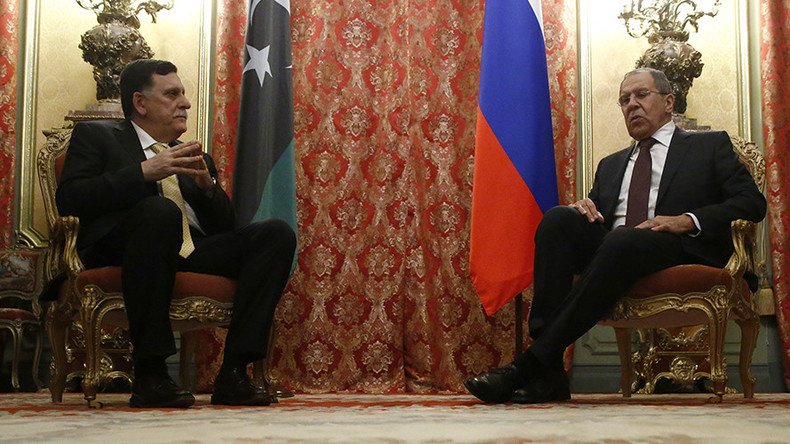Why Libya's cry for justice must be heard

Russian Foreign Minister Sergey Lavrov’s meeting in Moscow with Fayez al-Sarraj, prime minister of the Government of National Accord of Libya, reminds us that security and stability has yet to be restored in the war-torn country.
Though it may have slipped off the radar of global consciousness, Libya’s central importance when it comes a region that has been mired in conflict and chaos over the past few years cannot be overstated. The country’s destruction and societal collapse will forever stand as a withering indictment of Western foreign policy towards the region and NATO’s role, not as a defender of democracy, peace, and stability, but as an instrument of Western imperial power. The savage murder of Libyan leader Muammar Gaddafi at the hands of a NATO-supported mob in October 2011 was a ghastly and despicable crime, one that stands comparison with the legal lynching of Saddam Hussein in Iraq in 2006.
This is without factoring in the refugee crisis that erupted in the wake of Gaddafi’s overthrow, the worst such crisis the world has seen since the end of World War II. It involved untold thousands of men, women, and children attempting a perilous journey across the Mediterranean to Europe. According to the UN Refugee Agency (UNHCR), over 5,000 perished in 2016 alone while attempting to cross the Mediterranean, evidence that this ongoing human catastrophe shows no signs of improving.
Perhaps the most grievous aspect of the military campaign in support of regime-change in Tripoli was the fact that for most of the previous decade, Libya under Gaddafi had been an economic and strategic partner of the West, ending decades of enmity and isolation, with Western oil companies in particular benefiting from Gaddafi’s volte-face where Western governments were concerned.
'It is clear to everyone what is now happening in Libya: total destruction' - Gaddafi's cousin (EXCLUSIVE) https://t.co/2UqthjL3F3
— RT (@RT_com) 22 февраля 2017 г.
Writing in the Boston Globe in April 2011, writer and academic Alan J Kuperman reveals how “President Barack Obama grossly exaggerated the humanitarian threat to justify military action in Libya.” Later in the same article, he writes, “It is hard to know whether the White House was duped by the rebels or conspired with them to pursue regime-change on bogus humanitarian grounds. In either case, intervention quickly exceeded the UN mandate of civilian protection by bombing Libyan forces in retreat or based in bastions of Khadafy (sic) support, such as Sirte, where they threatened no civilians.”
Meanwhile, on the question of the character of the so-called revolution in Libya, as far back as August 2011, the BBC was reporting, “Islamists have played an important part in the uprising against Col Muammar Gaddafi, sparking concern about what role they will play in the new Libya.”
Regional African powers reject foreign intervention in Libya https://t.co/3AfRPvBVCt
— RT (@RT_com) 22 января 2017 г.
The BBC, one of the prime culprits among Western news organizations in making the case for ‘humanitarian intervention’ in Libya in 2011, was more accurate than it could ever have imagined in reporting the danger of Islamist involvement and influence in this ‘revolution.’
Fast-forward to 2017, and the country’s predicament could not be grimmer. ISIS and Al-Qaeda retain a strong foothold in the country, to the point where both groups, though former enemies, are now actively cooperating in Libya on plans to mount a fresh wave of attacks this year. In this they are taking advantage of the lack of a strong central government and any semblance of stability in a country that was turned from a functioning state into a failed state as a direct result of the NATO-supported regime-change in 2011.
It is all a far cry from 2010, when Libya enjoyed the status of a High Development Country in the judgment of the United Nations Development Programme (UNDP). In concrete terms, this status translates to a life expectancy of 74.5 years, a literacy rate of 88.4%, and foreign assets worth over $150 billion, among other favorable developmental and social indices.
6 years since start of #ArabSpring:
— RT (@RT_com) 17 февраля 2017 г.
- #Libya in chaos
- no signs of democracyhttps://t.co/kgtqJA4seipic.twitter.com/1GXGpWEOB1
This brings us back to the talks recently held in Moscow between Russian Foreign Minister Sergey Lavrov and Mr. al-Sarraj. In advance of them taking place, Kremlin spokesman Dmitry Peskov said, “Russia is interested in Libya finally becoming a working state after this barbaric intervention that was conducted from outside, that led to catastrophic consequences from the point of view of the Libyan state and the future of the Libyan people.”
Though Mr. al-Sarraj heads one of three competing authorities currently established in the country that are vying for legitimacy, his Government of National Accord is currently the only internationally recognized one, a fact emphasized by his visit to Moscow.
On a wider note, Russia’s role in Syria since 2015 has brought with it requests from governments and leaders across the region for diplomatic support. In recent months, the Kremlin has hosted talks between the Hamas and Fatah Palestinian factions, out of which emerged a commitment to forge a unity government, while the Astana talks on Syria in Kazakhstan in January saw Russia sit down with Turkey, Iran, and representatives of the Syrian government and Syrian opposition to try and make diplomatic progress in resolving the conflict.
In Washington, meanwhile, the circus that is US democracy seems unrelenting, what with newly elected President Trump at war with the media and elements of the intelligence community, and a political establishment that appears to be a model of dysfunction and paralysis.
The statements, views and opinions expressed in this column are solely those of the author and do not necessarily represent those of RT.














